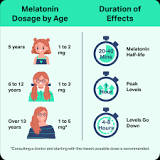For breastfeeding mothers, getting enough sleep can be a challenge, especially with the demands of caring for a newborn. One natural supplement that is often discussed in relation to improving sleep for both mothers and babies is melatonin.
Melatonin is a hormone produced by the pineal gland in the brain that helps regulate sleep-wake cycles. It is commonly taken as a supplement to help with sleep issues such as insomnia or jet lag. But what about melatonin and breastfeeding?
While melatonin supplements are generally considered safe for breastfeeding mothers, it’s always important to consult with a healthcare provider before starting any new supplement regimen. Some studies suggest that melatonin levels in breast milk are highest during the night and may help regulate the baby’s circadian rhythm.
However, it’s essential to note that melatonin supplements can vary in dosage and purity, so it’s crucial to choose a reputable brand and follow recommended dosages. Additionally, some experts recommend avoiding melatonin supplements while breastfeeding if you have certain medical conditions or are taking specific medications.
For breastfeeding mothers looking to improve their sleep quality naturally, there are other strategies to consider before turning to supplements like melatonin. Creating a relaxing bedtime routine, practicing good sleep hygiene, and ensuring a comfortable sleep environment can all contribute to better sleep for both mother and baby.
In conclusion, while melatonin supplements may be an option for breastfeeding mothers struggling with sleep issues, it’s essential to approach their use cautiously and seek guidance from a healthcare provider. Prioritizing healthy sleep habits and exploring natural ways to promote restful sleep can also be effective strategies for improving overall well-being during this demanding time.
8 Benefits of Melatonin for Breastfeeding: Enhancing Sleep and Well-being for Mother and Baby
- May help regulate the baby’s circadian rhythm
- Can potentially improve sleep quality for both mother and baby
- Natural hormone produced by the body
- Generally considered safe for breastfeeding mothers
- May be beneficial for mothers experiencing sleep disturbances
- Some studies suggest higher melatonin levels in breast milk at night
- Could aid in establishing a bedtime routine for the baby
- May provide a natural alternative to synthetic sleep aids
Five Concerns About Melatonin Supplementation During Breastfeeding
- Potential variability in melatonin levels in breast milk may affect its effectiveness in regulating the baby’s sleep-wake cycle.
- Melatonin supplements can interact with certain medications, posing a risk to both the breastfeeding mother and the baby.
- There is limited research on the long-term effects of melatonin supplementation on breastfeeding infants.
- Excessive use of melatonin supplements by the mother may lead to an oversupply of melatonin in breast milk, which could disrupt the baby’s natural sleep patterns.
- Individual responses to melatonin supplementation can vary, making it challenging to predict how it will impact both the mother and baby.
May help regulate the baby’s circadian rhythm
Melatonin supplementation in breastfeeding mothers may offer the benefit of helping regulate the baby’s circadian rhythm. Studies suggest that melatonin levels in breast milk are highest during the night, potentially aiding in establishing a natural sleep-wake cycle for the infant. By introducing melatonin through breastfeeding, mothers may support their baby’s development of a consistent sleep pattern, which can be beneficial for both the baby’s well-being and the overall family dynamics.
Can potentially improve sleep quality for both mother and baby
Melatonin supplementation while breastfeeding can potentially improve sleep quality for both the mother and baby. As melatonin helps regulate sleep-wake cycles, higher levels of melatonin in breast milk during the night may aid in establishing a healthy circadian rhythm for the baby. By potentially enhancing the quality of sleep for both mother and baby, melatonin breastfeeding could lead to better rest, improved mood, and overall well-being for both individuals. However, it’s important for breastfeeding mothers to consult with a healthcare provider before incorporating melatonin supplements into their routine to ensure safety and effectiveness.
Natural hormone produced by the body
Melatonin is a pro for breastfeeding mothers due to its natural origin as a hormone produced by the body. As a naturally occurring substance, melatonin is already familiar to the body’s systems, making it a potentially safe and well-tolerated supplement for promoting better sleep quality. This natural aspect of melatonin can provide reassurance to mothers who are cautious about introducing synthetic or unfamiliar substances into their bodies while breastfeeding. By leveraging the body’s own production of melatonin, breastfeeding mothers may find comfort in using a supplement that aligns with their physiological processes, potentially supporting improved sleep patterns for both themselves and their infants.
Generally considered safe for breastfeeding mothers
One significant advantage of melatonin for breastfeeding mothers is that it is generally considered safe for consumption while nursing. This means that mothers can potentially benefit from the sleep-regulating effects of melatonin without posing a risk to their breastfeeding infants. With proper guidance from healthcare providers and adherence to recommended dosages, breastfeeding mothers can explore the use of melatonin as a natural supplement to support their sleep quality and overall well-being during this demanding period.
May be beneficial for mothers experiencing sleep disturbances
Melatonin supplementation while breastfeeding may be beneficial for mothers experiencing sleep disturbances. The hormone’s role in regulating sleep-wake cycles can potentially help improve the quality and duration of sleep for mothers struggling with insomnia or disrupted sleep patterns due to caring for a newborn. By enhancing the natural circadian rhythm and promoting deeper, more restful sleep, melatonin supplementation could offer much-needed relief for exhausted mothers, ultimately supporting their overall well-being during this challenging period.
Some studies suggest higher melatonin levels in breast milk at night
Some studies suggest that breastfeeding mothers may have higher levels of melatonin in their breast milk during nighttime hours. This natural increase in melatonin levels at night could potentially help regulate the baby’s circadian rhythm and promote better sleep patterns for both the mother and the infant. The presence of melatonin in breast milk highlights the intricate ways in which a mother’s body supports her child’s development and well-being, emphasizing the importance of breastfeeding as a nurturing and beneficial practice for both parties involved.
Could aid in establishing a bedtime routine for the baby
Melatonin breastfeeding could potentially aid in establishing a bedtime routine for the baby. The presence of melatonin in breast milk, particularly higher levels at night, may help regulate the baby’s circadian rhythm and promote a sense of sleepiness during nighttime feedings. By introducing melatonin naturally through breastfeeding, mothers may inadvertently support their baby’s natural sleep-wake cycle, making it easier to establish a consistent bedtime routine. However, it is important for breastfeeding mothers to consult with a healthcare provider before considering any supplementation to ensure the safety and appropriateness of using melatonin to support their baby’s sleep patterns.
May provide a natural alternative to synthetic sleep aids
Melatonin breastfeeding may offer a natural alternative to synthetic sleep aids for nursing mothers experiencing sleep disturbances. By potentially increasing melatonin levels in breast milk, mothers can support their own and their baby’s sleep-wake cycles without resorting to artificial sleep aids. This natural approach aligns with many mothers’ desires to avoid unnecessary chemicals and medications while promoting healthy sleep patterns for themselves and their infants. Consulting with a healthcare provider before incorporating melatonin supplements into a breastfeeding routine is advisable to ensure safety and effectiveness.
Potential variability in melatonin levels in breast milk may affect its effectiveness in regulating the baby’s sleep-wake cycle.
The potential variability in melatonin levels in breast milk poses a con when considering its effectiveness in regulating the baby’s sleep-wake cycle. Since melatonin levels can fluctuate throughout the day and night, the amount of melatonin transferred to the baby through breastfeeding may not always be consistent. This inconsistency could impact the supplement’s ability to effectively synchronize the baby’s circadian rhythm, potentially leading to challenges in establishing a predictable sleep pattern for both mother and child. It is important for breastfeeding mothers to be aware of this variability and to consider other factors that may influence their baby’s sleep habits while incorporating melatonin supplementation into their routine.
Melatonin supplements can interact with certain medications, posing a risk to both the breastfeeding mother and the baby.
Melatonin supplements can pose a significant risk to breastfeeding mothers and their babies due to potential interactions with certain medications. It’s crucial for breastfeeding mothers to be aware that melatonin can interact with various drugs, affecting their efficacy or causing adverse effects. These interactions can be particularly concerning for both the mother and the baby, as the transfer of substances through breast milk can impact the infant’s health and development. Therefore, caution should be exercised when considering melatonin supplementation while breastfeeding to avoid any potential risks associated with drug interactions. Consulting a healthcare provider before introducing melatonin supplements is essential to ensure the safety and well-being of both the mother and the baby.
There is limited research on the long-term effects of melatonin supplementation on breastfeeding infants.
One significant concern regarding melatonin supplementation for breastfeeding mothers is the limited research on the long-term effects of this hormone on infants. While some studies suggest that melatonin levels in breast milk may help regulate the baby’s sleep-wake cycle, the potential impacts of consistent exposure to supplemental melatonin remain unclear. Without comprehensive research on how melatonin supplementation could affect infants over an extended period, there is a lack of certainty about its safety and potential consequences. Therefore, caution and further investigation are warranted before considering melatonin as a regular supplement for breastfeeding mothers.
Excessive use of melatonin supplements by the mother may lead to an oversupply of melatonin in breast milk, which could disrupt the baby’s natural sleep patterns.
Excessive use of melatonin supplements by the mother may lead to an oversupply of melatonin in breast milk, which could disrupt the baby’s natural sleep patterns. Babies rely on cues from their environment to regulate their own circadian rhythm, and an excess of melatonin in breast milk may interfere with this process. Disrupted sleep patterns in infants can result in difficulties with establishing a consistent sleep routine and may lead to increased fussiness and restlessness. It is important for breastfeeding mothers to be mindful of their melatonin intake and consider the potential impact on their baby’s sleep patterns before using supplements excessively. Consulting with a healthcare provider is always recommended when considering any new supplement regimen while breastfeeding.
Individual responses to melatonin supplementation can vary, making it challenging to predict how it will impact both the mother and baby.
Individual responses to melatonin supplementation can vary, posing a significant con for breastfeeding mothers. The unpredictable nature of how melatonin will affect both the mother and baby can make it challenging to determine the optimal dosage and timing for supplementation. Factors such as metabolism, sensitivity to hormones, and overall health status can all influence how individuals respond to melatonin. This variability highlights the importance of caution and individualized guidance when considering melatonin as a sleep aid while breastfeeding, as what works well for one person may not have the same effects for another. Consulting with a healthcare provider is crucial to ensure safe and appropriate use of melatonin in this context.


